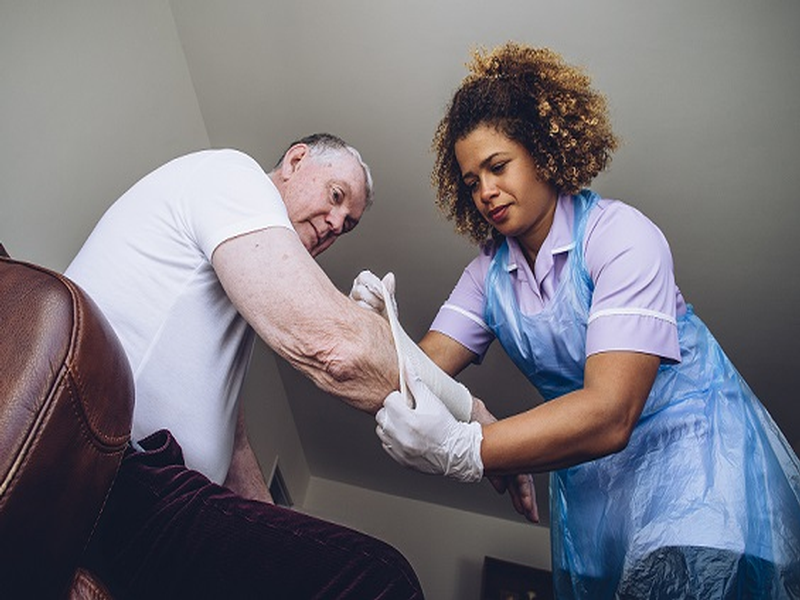Social care levy's £500m cash boost won't deliver a 'fair wage' say care bosses
Care homes and home care services will receive £500 million from the new Health and Social Care Levy, to improve staff recruitment and wellbeing but care bosses say it won’t make councils pay an “honest” price for care to give workers a “fair wage”.

From 6 April, the Health and Social Care Levy comes into force and will see an extra 1.25p in the pound in National Insurance Contributions paid by bosses and employees across the UK. The government has earmarked £500 million of the levy to tackle the care workforce crisis by boosting staff recruitment, retention, training and wellbeing.
Care minister: ‘Level up’ for care staff
With more than 105,000 care job vacancies, and almost 500,000 extra vacancies expected by 2035, the £500 million will go towards funding Care Certificates and improving its transferability across care settings, so that so workers do not need to repeat the certificate when changing jobs.
The cash will also provide mental health support for staff and give them greater access to occupational health services. More investment in training, new policies to identify the best recruitment practices locally and a new digital hub will be created for workers to get advice and a portable record of their learning and development.
Care minister Gillian Keegan said: “As we recover from Covid, we must look to the future and to reform - this £500 million package of support will boost workforce recruitment, allow staff to progress in their careers in the sector and very importantly, ensure staff wellbeing is better supported.
“The type of genuinely transformational change cannot be accomplished overnight. We know staff will need continued support, but we hope this package will level up opportunities for current and future social care staff.”
Won’t deliver ‘true, honest’ price for care
Some £5.4 billion over the next three years (out of a total £36 billion generated by the levy) will be given to adult social care but the lion’s share will go to fund the NHS.
Mike Padgham, chair of the Independent Care Group (ICG), which represents care homes and domiciliary care providers, says the £500 million cash injection won’t help local authorities pay them “a true, honest and accurate price for the care they deliver”.
Mike Padgham said: “Any penny invested in social care is a penny invested in the furtherance of care of our oldest and most vulnerable and is to be welcomed.
“But what we really need to see is a huge proportion of the Health and Social Care Levy invested in helping local authorities to pay providers a true, honest and accurate price for the care they deliver.
“Then we might, as care providers, be in a position to pay staff what they deserve and create a sector in which people can make a real difference to other people’s lives but be paid a fair wage for doing so.
“At the moment, that isn’t possible and so whilst the announcement of this fund is very positive, it doesn’t address the fundamental issue of attracting people to work in our sector instead of working elsewhere.”
Infection control and testing funds end
Many care providers are wondering how they will survive, particularly as the government has stopped the infection control fund (£1.3 billion) and testing fund (£288 million) which providers had been receiving during the Covid-19 pandemic.
The Department for Health and Social Care states that the levy has prompted five local authorities in England to announce a new adult social care charging reform system which caps the cost of care.
The local authorities are adopting charging reform plans in January 2023, before a national rollout in October 2023. The local authorities taking part are Wolverhampton, Blackpool, Cheshire East, Newham and North Yorkshire.
The number of people waiting for elective care in England is six million - up from 4.4 million before the pandemic but the government hopes the vast majority of levy's funds will tackle the NHS waiting list by offering more appointments and operations.
Mr Padgham added: “Investing in infrastructure and in staff progression and development is all very laudable, but what we need is the government to invest more into social care so that our staff are as well rewarded, recognised and respected as those in the NHS – which at the moment they are not.”
Latest News
 29-Jul-24
Dementia Bus gives carehome.co.uk staff insight into life with dementia
29-Jul-24
Dementia Bus gives carehome.co.uk staff insight into life with dementia
 01-Mar-24
Find out the top care homes in 2024
01-Mar-24
Find out the top care homes in 2024
 21-Mar-23
UK's top care homes in 2023 revealed
21-Mar-23
UK's top care homes in 2023 revealed
 03-Jan-23
carehome.co.uk launches free care helpline
03-Jan-23
carehome.co.uk launches free care helpline
 13-Dec-22
5 mins with Emily Whitehurst, chief operating officer for Constantia Healthcare
13-Dec-22
5 mins with Emily Whitehurst, chief operating officer for Constantia Healthcare